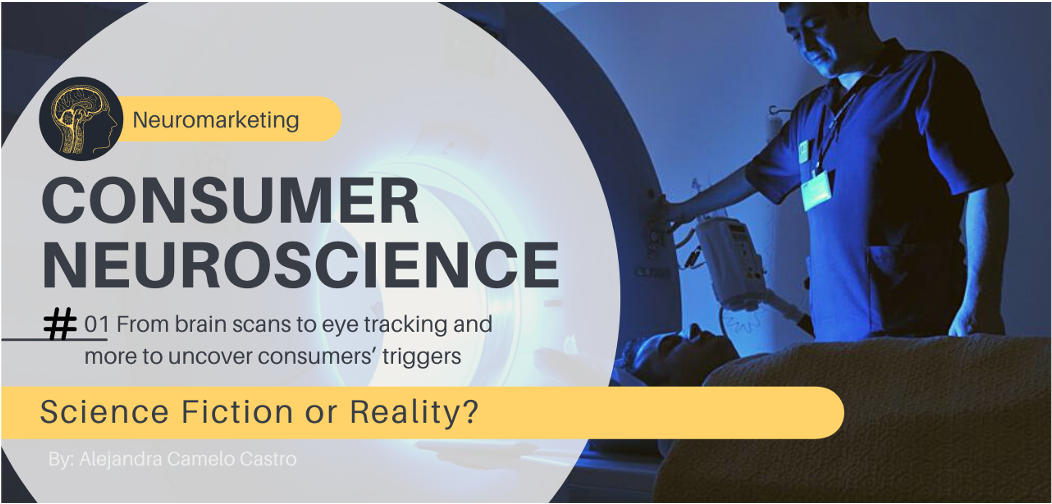Brain scans, eye tracking, skin conductance recording, heart rate monitoring, and facial mapping, are this all in use to find what triggers consumer’s motivations, preferences, and decisions? Is this just science fiction or reality? Let me know your initial thoughts in the comments!
What is neuromarketing, and what does it has to do with brain scans and consumer’s decisions?
Neuromarketing is the product of the meeting between neuroscience and marketing. prof. dr. Ale Smidts conceived the concept in 2002 as “The study of the cerebral mechanism to understand consumer behavior to improve marketing strategies”, which sets a convenient birthdate for the concept. However, there were activities being conducted before this date with a close relationship to what is called neuromarketing today, such as Pupillometry studies in the 1970s, EEG studies at the University of Wisconsin-Madison in the 1980s, and Positron emission tomography (PET) studies at Harvard in the 1990s (Levallois, Smidts, and Wouters ,2020).
Since its birth, multiple definitions have developed, according to an article at Harvard Business Review, the field of neuromarketing, interchangeably known as consumer neuroscience, loosely refers to the measurement of physiological and neural signals to gain insight into customers’ motivations, preferences, and decisions. Its most common methods are brain scanning, which measures neural activity, and physiological tracking, which measures eye movement and other body responses for that activity. So if you thought it was science fiction, start changing your mind and keep on reading!
Also characterized as a field that concentrates on the marketing implications from understanding the interaction of cognition and emotions in human behavior based on neuroscientific methods (Javor,et all 2013), or among other definitions, as “an extension of traditional marketing methods that seeks a deeper level of manipulation based on instinctive responses” (Nemorin, 2017). Yes, you read that right. This young field has faced multiple controversies, and for a detailed historical review, visit Levallois, et all (2020).
I will leave you to wrap your head around this topic with a great TEDx talk by Sam Usher. He offers a fantastic illustration with a real-life example by scrutinizing Pepsi’s lousiest commercial from a neuromarketing perspective. He concludes with what consumers can do to protect themselves against over manipulative ads, while still allowing our marketing teams to create the engaging ads that companies need to stand out.
Stay tuned to future posts! I will continue to explore this unique field to bring you everything you want and need to know about it, so leave me your questions in the comments below!
https://www.youtube.com/watch?v=hMkkVCQdoa4




Interesting article! Who would have thought that this was already reality.
Thank you Fatima for your comment! So true! That is way I am writing about it, I think is its very interesting and I found many that never heard of it! If you have any part of it that you would like to know more about, let me know and i will be happy to help!
Very interesting article on a current topic! I think that such methods and neuromarketing are becoming more and more present. But I think it is still up to us how far we allow ourselves to be influenced by such methods in our consumption behaviour.
Danja! I am so happy to know you find it interesting! I agree with you, it is a current topic that keeps gaining strength, I found some interesting changes in the way that companies have been (or have not been) divulging their relation with neuromarketing in the last few years, I will write about it soon! About the influence, yes totally, we are not helpless against it and we have a way to analyze and make rational decisions.
It’s amazing work, I so proud of you
Diana! Thank you, Did you know anything about neuromarketing before reading this?? Anything else you would like to know about this?, let me know, I will be happy to write about it!
Very interesting! Brava!
Thank you Ana!
Really interesting. I love those topics. Thank you for sharing
Amazing article, very interesting!
Thank you, Rapha! I am glad you liked it!
Great introduction. I’m looking forward to reading more! Im interested in learning about what fields are already making use of neuromarketing and how.
Thanks for sharing, it’s incredibly interesting.
Are tactics like eye tracking even possible with today’s technology (like on a smartphone)?
I can see heart rate as a tool in reality, with devices like a smart watch.
Face mapping might also already be a reality.
I like that you ended with a reference to a Ted talk, for me it created even more interest.
keep sharing 🙂
Robin Thank you for your comment!
Here’s an interesting infographic created by iMotions that I would like to share with you about eye Tracking: http://neurorelay.com/2016/09/11/eye-tracking-infographic/
Currently, for eye tracking, there are remote devices, such as wearable eye-tracking glasses technology to capture and analyze natural visual behavior in real-world scenarios while ensuring outstanding robustness and accuracy. And Screen-based tracking systems are designed to analyze the visual response to stimuli displayed on a screen. Soon I will be writing in more detail about the tools and their uses and will share the link with you! I hope to have shed some light for now on your question.
I am glad to know you enjoyed the article and the Ted talk,
Thanks for your support!
Super interesting topic. As advertisement has always tried to tap into our subconsciousness with really easy tricks (like using carpet in areas youre supposed to walk more slowly in) its downright scary to think of the possibilities tech can offer now or in the future that simulate needs that werent there before by dissecting human behavior and setting it up as easy to consume wares. Thank you for this article and shining the spotlight at a topic that we dont like thinking about but what will eventually be part of our everyday life.
Pauline thank you for sharing your thoughts with me!
Your concerns are normal, there is an interesting article from the Harvard Business Review that I want to share with you, that covers these concerns: https://hbr.org/2019/01/when-neuromarketing-crosses-the-line.
My main takeaway from it is that Neuroscience will never be a threat to our free will, as neuromarketing evolves it will provide more information on consumer behavior to a limited extent, citing the article: “That’s in part because no single factor determines how you’re going to act when allowed to buy something. Neuroscience research can uncover one factor—for example, how tired you are—that affects the probability that you’ll act a certain way. But lots of other factors are at play: What kind of mood are you in? When did you last have a meal? Are your friends with you? How is the light pointed at the product? Nothing neuroscience could ever measure could definitively drive a particular purchase, because all those other factors also have input. We’re never going to be able to say, “If we measure this blood flow in your brain using fMRI, then we know you will buy this car.” Neuroscience will never be a threat to our free will”
I hope this helps to see this topic in a less scary light!
What a great article and TED speech, I totally agree that neuromarketing should only be used for consumer products!
Dear SW, Thank you for your positive comments!
Great article! It got me engaged from the beginning until the end. It is very interesting the impact that a “simple” advertisement can have. It kept me wondering about the importance of advertising ethics and the power that creators of content have in their hands. Thank you Alejandra for a very interesting topic to take into consideration. I am looking forward fo the next one.
Dear Vanessa, Thank you for sharing your thoughts with me! I agree with you that advertising needs to be guided by a strong frame of ethics to cause positive benefits for those involved. My next post is coming out this week. I would love to read your comments about it!
Great to have this insight never heard of this topic before yet of great help and knowledge keen on getting more such articles to learn from it.
Splendid job Alejandra